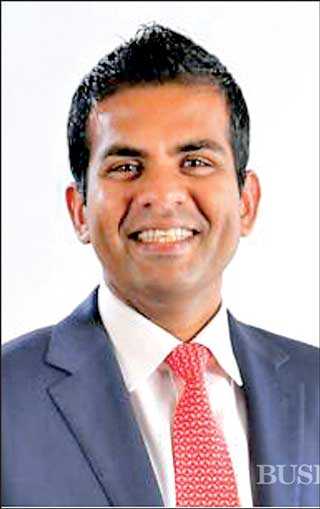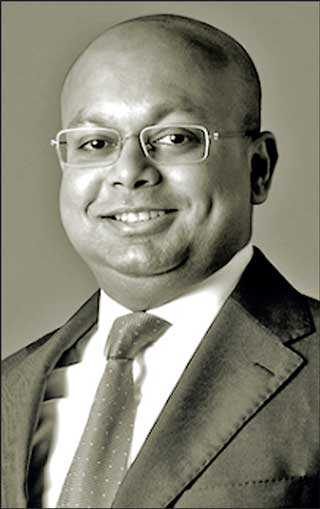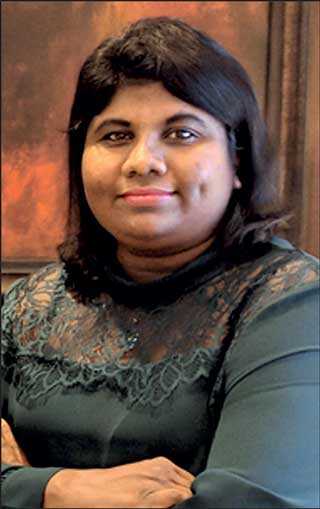Wednesday Feb 25, 2026
Wednesday Feb 25, 2026
Friday, 13 November 2020 00:30 - - {{hitsCtrl.values.hits}}
By Darshana Abayasinghe
 |
| Lanka Realty Investments Executive Director Hisham Jamaldeen |
 |
| Lynear Wealth Management Managing Director Dr. Naveen Gunawardane |
 |
| NDB Wealth Management Vice President Asset Management Vidhya Jayasekera
|
As countries and markets develop, investors will start looking at different forms and classes of investments with real returns coming for those looking at the longer-term. This was consensus amongst speakers a special forum organised by CIMA Sri Lanka and the Colombo Stock Exchange last week
titled ‘Get the Best Out of the Stock Market’.
Macro impact to market
Speaking during the discussion, Lanka Realty Investments Executive Director Hisham Jamaldeen noted that if a person invested Rs. 1,000 in a fixed deposit 20 years ago, he or she would have earned Rs. 10,283 by now, whereas an investment in equity market would have likely yielded Rs. 21,037 for the same person during the period. “Now this goes to show holding power.”
Stating there must be a cultural shift moving away from relying primarily on savings, Jamaldeen pointed out 6,000 new accounts had opened up between May and August 2020, which is up 90% from the same period last year. Up to 47% of those accounts are persons between 18 and 30 years of age.
“As the country matures, we need to start looking in terms of different forms of savings and investments. If you go into a fund for the long-term, even if the macro fundamentals don’t look good, there is opportunity. You need to consider what type of investment you are looking at, whether it is income you are looking at and how much are you looking to buy. You work with a good broker and do your own study; look at how well operating cash cycles are working. I think our market has a significant amount of legs. It’s a small market, but in times of global crises, Sri Lanka has somehow always performed,” Jamaldeen added.
Short-term expectations
Setting the tone and detailing macro trends in the market, NDB Wealth Management Vice President Asset Management Vidhya Jayasekera noted that following the lockdown in Q2, the market was expected to pick up in Q3 and Q4 2020. People’s sentiments had taken an upward swing by July, she said.
However, with the third COVID wave it’s changing and Google Mobility Trends show drastic drops in October and economic activity is once again slowing down. She added the budget deficit is expected to be about 10% of GDP. The decline is due to dip in revenues, expenditure has come down. “We are not collecting enough taxes, when this happens, we have to borrow,” she said.
Inflation has been fairly under control; sitting 4% in September on the back of supply chain dynamics being restricted and global oil prices. In terms of credit growth to the Government, year-on-year there is about a 37% growth. The Central Bank of Sri Lanka has promoted reduced rates to promote economic growth by facilitating lending, but attractive deposit rates are no longer available to people.
Foreign holdings of Sri Lankan Government securities have been steadily declining. In 2013 about 12% of government securities were held by foreigners, but now it is only 0.2%.
“We only give about 2.8% over the dollar, and we have gone through some major downgrades in terms of ratings,” Jayasekera noted.
“The market saw foreign outflows of retail and high net worth individuals and institutions. Earnings growth this second quarter has dropped about 43% because of the situation. What is the solution? Do you participate despite the sentiments? One-year returns are fairly volatile with a high probability of loss. But this changes over the longer term. On a non-annualised basis our shares have gone up by 1,729%. The power of holding period returns is great. The market has come down over 25%. If you can choose some good companies and weather the storm, the potential for greater returns is much better,” she added.
Reforms will pave way
During the discussion, Lynear Wealth Management Managing Director Dr. Naveen Gunawardane pointed out Sri Lanka at the moment is at the bottom of the interest rate cycle, adding the exchange rate will most likely stay stable the rest of this year. However, foreign debt payments will challenge our position for the next few years, and the country will need some capital coming into its reserves. However, a bounce back is anticipated globally next year, particularly if COVID goes away.
Jamaldeen concurred with the views expressed by Gunawardane and said interest rates would have to be maintained at current levels until economic activity picks up. He pointed out that external shocks are becoming a new normal for most economies, as such shocks had been rising in pace and frequency over the past five years. One of the main tools to manage such shocks is low interest rates.
Jamaldeen added that it would be interesting to note how Government tackles reform especially given the debt repayment scenario, and the extent of reform would spell how successful the country would be in terms of macro level indicators.
Fixed assets vs equity
Commenting further on the potential of capital markets, Gunawardane stated that equity outperforms fixed income assets and this had been seen across many markers. As a country’s economy develops, there are structural change in interest rates, and Sri Lanka will go back to middle income and then high-income category, we cannot expect 20% interest rates. That is where equity as a particular asset class becomes interesting, he said. Valuations right now are very attractive, he added. Pointing to the banking sector during the month of May, the last time those valuations were seen was just before the war ended, Gunawardena added. These are once-in-a-while opportunities if investors take a longer-term view.
In addition, considering inflation at 5.5%, with Fixed Deposit rates at 5% and Treasury Bills at 4.99% we are now effectively flirting with negative real rates. “So, does it make any sense to put money in fixed income at all, it certainly does not make sense to put money into savings accounts,” he opined.
“I think the banking sector is very attractive, with some of the larger banks at 0.4 - 0.5 book value. There is no reason why these banks should be trading at these valuations even with the moratorium in place. Even if one were to assume there will be a pickup in Non-Performing Loans, there is no reason why they should be trading at half or less than half. The other sector to look at on the longer-term is domestic consumption. Consumers are showing a bounce back. But those are sectors need a longer-term view. In January and February, we were looking at an economy which was expanding. We had stimulus given in the form of tax breaks which fuelled consumers. Once the lockdown lifted the economy came back online, but we need to see what happens with the current round,” Gunewardena stated.
New instruments and classes
Jamaldeen also pointed to the buoyant consumer market, noting he thinks it’s also a lot to do with grey market imports being restricted. With restrictions mainstream players are immediate beneficiaries. He felt if one were to look at the Sri Lankan market in terms of sectors, banking would be the only one that stands out. He advises investors to look at the longer-term, even sectors like power where effectively it is a long-term contract with the government and one gets a return on payment in 20 years.
“That for me is effectively a separate asset class, which is effectively a government bond. You are getting a higher rate and that is an opportunity to look at.” It is not just about price, he added, and “don’t look simply at discounts. Good companies will be expensive and the trajectory of where they are going will significantly outweigh a company which is very cheap.”
Commenting on Real Estate Investment Trusts (REITs), with Sri Lanka just introducing legislation around it, Jamaldeen opined these do not currently look attractive as returns for holders. Sri Lanka presents income yielding property asset class and development assets which includes affordable housing products and industrial parks.
“Sri Lanka has introduced rules mostly around income yielding products. With the type of return these are producing it is going to be very difficult to attract people to come into that format. Good news is; yes we have REITs but the format is not ready and needs some fine tuning. And there is an issue with Stamp Duty, for when you move assets in and out of a REIT it should be stamp duty free. When you add another 4% the whole equation goes down.
“For a company what REITs could do is it clears your balance sheet. It effectively takes on a property asset and gives a long lease and takes that off the balance sheet. Then suddenly there is more capital. It works well for long-term pension funds, it gives retailers access to real estate in markets, but I don’t see people running down there to set up REITS in its current format,” Jamaldeen averred.